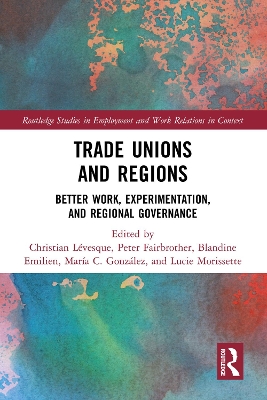Routledge Studies in Employment and Work Relations in Context
2 total works
Unions and Globalisation
by Peter Fairbrother, John O'Brien, Glynne Williams, Michael O'Donnell, and Anne Junor
Published 6 September 2011
In recent decades, trade unions have suffered major reversals and experienced declining memberships. Transnational corporations and state-owned multi-nationals have increasingly implemented deteriorating terms and conditions of employment, with vulnerable and insecure job contracts. In this context, there has been a wide-ranging debate about the form of trade unionism, the bases for collective organization and struggle and the future of trade unionism. This book addresses these questions both theoretically, in relation to debates, as well as substantively via a series of selected studies. It is a must read for all those studying industrial relations, human resource management, the sociology of work and employment, economic sociology, economic and labor geography and business studies in general.
Trade Unions and Regions
by Blandine Émilien, Peter Fairbrother, María C. González, and Lucie Morissette
Published 9 August 2022
Trade Unions and Regions: Better Work, Experimentation, and Regional Governance is about the place of workers and their unions in the modern world. It addresses current challenges for unions working in regions and the experiments that may take place at this level of governance. The book addresses pressing questions concerned with the conditions for better work and a humane society. The focus is on the capacities of unions to address questions relating to regional governance, in both supranational and sub-national regions. It examines workers and their unions in a variety of contexts: multinationals, industries, workplaces, and communities. The authors address the experiments that can be initiated by unions, governments, or employers and the ways in which collective organisations engage to address these matters in regional contexts. The analysis takes as a starting point the fracturing and divisions evident in various regions, in Australia, Canada, Mexico, Spain, the United Kingdom, and USA. The contributors propose novel analyses with lessons for unions. It should be of interest to union activists and leaders, political parties, governments, and those who make decisions in and about regions. Researchers and students of labour markets, political mobilisation, and employment relations will take the analyses further.

